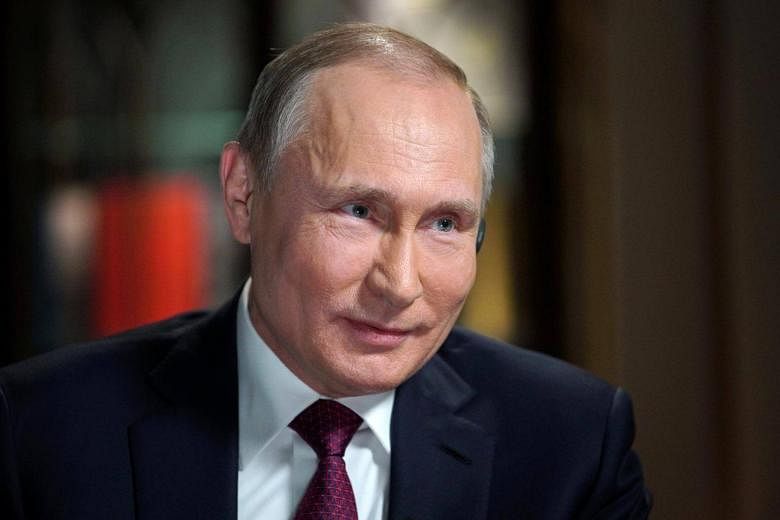MOSCOW (AFP) - With little suspense over the eventual winner of the March 18 presidential election, Vladimir Putin has cruised through a laid-back campaign for a fourth term, focusing on a couple of keynote appearances.
The official emphasis has shifted to ensure a good turnout, with a colourful line-up of candidates allowed to stand - as long as they pose no real threat.
Here are some interesting snippets about the campaign.
Putin's 'two minute' campaign
Putin has almost opted out of direct campaigning, eschewing participation in debates and filming no fresh material for videos.
So far he has given a two-minute speech in Moscow's Luzhniki stadium as tens of thousands of supporters cheered in sub-zero temperatures.
"Together we are a team. Are we a team?" he asked the crowd, which replied, "Yes!".
State-controlled television has done the work for Putin with slavish coverage of his every move.
Memorably, he stripped to swimming trunks to jump into an ice hole for Orthodox Christian festivities in January.
More common than Putin's own campaign posters are billboards simply urging people to vote, as the Kremlin focuses on high turnout, particularly among young people.
The same message has come across in viral videos, a photo-shoot with lingerie-clad models and ads on youth-oriented television.
Flexing missiles
In a state of the union address that was not officially a campaign speech, Putin became most animated as he demonstrated the country's mighty arsenal.
Presenting a host of weapons in development and testing, he boasted they are "invulnerable" to current missile and air defences.
Things had moved on from the years when the Russian military was in the doldrums, the president stressed.
"No one listened to us then. Listen to us now," he urged, winning a standing ovation.
Water throwing
Rivalry between two candidates - veteran nationalist politician Vladimir Zhirinovsky and liberal former reality TV show host Ksenia Sobchak - has led to ugly scenes.
During filming of a televised debate, Sobchak became enraged as Zhirinovsky mocked her career and called her "thick".
She threw a glass of water over him, to which he responded by calling her a "whore," one of the worst expletives in Russian.
Things took a more sinister turn as a man stood waiting for Sobchak after a dinner and threw water over her, saying: "This is for Zhirinovsky!". She wrote on social media that it caused her to slip and fall.
It turned out the attacker was working as an intern for the head of Moscow city parliament, who later dismissed him.
Media attacks
Communist candidate Pavel Grudinin has suffered what he calls a smear campaign in pro-Kremlin media after standing for the largest parliamentary opposition party.
The agri-business owner, forecast to be runner-up, has faced repeated accusations of hiding foreign bank accounts and owning property abroad, which he has denied.
The rumbles began as opinion polls suggested support for Grudinin was growing.
Analysts told AFP that the Kremlin wants Grudinin to do reasonably well and boost turnout, but not erode Putin's vote share.
Crackdown on opposition leader
Opposition leader Alexei Navalny has been barred from polls due to a criminal conviction he calls politically motivated. He has told followers to boycott the vote.
Now he is in limbo, awaiting a court hearing for organising an unauthorised protest in January and a likely 30 days in prison that could ensure he is behind bars on election day.
Russia blocked Navalny's personal website after he posted a video alleging a deputy prime minister enjoyed lavish hospitality from billionaire tycoon Oleg Deripaska.
He eventually took the video down while leaving it on YouTube where it has been viewed more than six million times.

